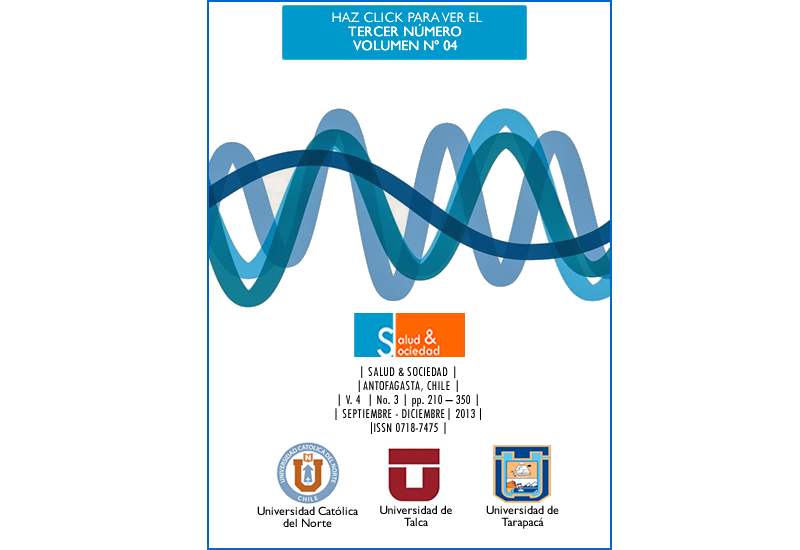Perdón y satisfacción marital: Una mirada desde lo sistémico.
DOI:
https://doi.org/10.22199/S07187475.2013.0003.00005Palavras-chave:
Perdón, satisfacción marital, relaciones de pareja, Forgiveness, marital satisfaction, couple relationships,Resumo
Este estudio tuvo como objetivo evaluar el efecto del perdón sobre la satisfacción marital en una muestra de 96 parejas heterosexuales, incorporando una perspectiva sistémica. Para ello, se realizó un estudio transversal, con un diseño no experimental, en el que ambos miembros de la díada completaron el Transgression-Related Interpersonal Motivations Inventory (McCullough et al., 1998) y la Marital Satisfaction Scale (Roach et al., 1981). Los resultados permiten concluir que la tendencia a la evitación y los pensamientos de venganza predicen menor satisfacción marital en hombres y mujeres. Asimismo, se observó que existe asociación directa entre las conductas de evitación y venganza desarrolladas por uno de los miembros de la pareja y el mismo tipo de conductas en el otro. Adicionalmente, se identificó que es la evitación de los hombres y la venganza de las mujeres la que tiene un efecto negativo sobre la satisfacción del compañero/a romántico.
The objective of this study is to evaluate from a systematic perspective the effect of forgiveness on marital satisfaction in a sample of 96 Chilean heterosexual couples. A cross-sectional study with a non-experimental design was conducted. Both members of the dyad completed the Transgression-Related Interpersonal Motivations Inventory (McCullough et al., 1998) and the Marital Satisfaction Scale (Roach et al., 1981). The results lead to the conclusion that the tendency to avoid the partner and thoughts of revenge predict lower marital satisfaction both in men and women. It was also noted that there is a direct association between avoidance and revenge carried out by one of the partners and the same type of behavior carried out by the other. Moreover, it was found that avoidance conduct by men and revenge on the part of women have a negative effect on companionship/romantic satisfaction.
Downloads
Referências
Bradbury, T. N., Fincham, F. D., & Beach, S. R. H. (2000). Research on the nature and determinants of marital satisfaction: A decade in review. Journal of Marriage and the Family, 62 (4), 964-980. doi: 10.1111/j.1741-3737.2000.00964.x
Braithwaite, S. R.; Selby, E. A. & Fincham, F. (2011). Forgiveness and Relationship Satisfaction: Mediating Mechanisms. Journal of Family Psychology, 25, 551–559. doi: 10.1037/a0024526
Feeney, J. A. (2002). Attachment, marital interaction and relationship satisfaction: A diary study. Personal Relationships, 9(1), 39-55. doi: 10.1111/1475-6811.00003
Fincham, F. D. & Beach, S. R. H. (2002). Forgiveness in marriage: Implications for psychological aggression and constructive communication. Personal Relationships, 9, 239-251. doi: 10.1111/1475-6811.00016
Fincham, F.D., Hall, J. & Beach, S. R. H. (2006). Forgiveness in marriage: Current status and future directions. Family Relations, 55, 415-427. doi: 10.1111/j.1741-3729.2005.ca
Fincham, F. D., Jackson, H. & Beach, S. R. H. (2005). Transgression severity and forgiveness: Different moderators for objective and subjective severity. Journal of Social and Clinical Psychology, 24, 860- 875.
Finkel, E. J., Rusbult, C. E., Kumashiro, M. & Hannon, P. A. (2002). Dealing with betrayal in close relationships: Does commitment promote forgiveness? Journal of Personality and Social Psychology, 82, 956-974. doi: 10.1037/0022-3514.82.6.956
Gordon, K. C. & Baucom, D. H. (2003). Forgiveness and marriage: Preliminary support for a measure based on a model of recovery from a marital betrayal. The American Journal of Family Therapy, 31, 179-199. doi: 10.1080/01926180301115
Gordon, K. C., Hughes, F. M., Tomcik, N. D., Dixon, L. J. & Litzinger, S. (2009). Widening spheres of impact: The role of forgiveness in individual, marital, and family functioning. Journal of Family Psychology, 23(1), 1-13. doi: 10.1037/a0014354
Gottman, J. (1999). The Marriage Clinic. A scientifically based marital therapy. W.W. Norton & Company Ltd., New York.
Gottman, J. & Levenson, R. (1999). Rebound from marital conflict and divorce prediction. Family Process, 38, 287-292 Greenberg, L., Warwar, S. & Malcolm, W. (2010). Emotion-focused couples therapy and the facilitation of forgiveness. Journal of Marital and Family Therapy, 36(1), 28-42. doi: 10.1111/j.1752-0606.2009.00185.x.
Guzmán, M. (2010a). El Perdón en Relaciones Cercanas: Conceptualización desde una Perspectiva Psicológica e Implicancias para la Práctica Clínica. Psykhe, 19(1), 19- 30. doi:10.4067/S0718-22282010000100002
Guzmán, M. (2010b). Apego y perdón de transgresiones relacionales ocurridas en la pareja: El rol mediador de las atribuciones negativas y la satisfacción. Tesis no publicada para obtener el grado de Doctor en Psicología, Pontificia Universidad Católica de Chile, Santiago, Chile.
Johnson, S. M., Makinen, J. A. & Millikin, J. W. (2001). Attachment injuries in couple relationships: A new perspective on impasses in couple therapy. Journal of Marital and Family Therapy, 27, 145-155.
Kachadourian, L. K., Fincham, F. & Davila, J. (2004). The tendency to forgive in dating and married couples: The role of attachment and relationship satisfaction. Personal Relationships, 11, 373-393. doi: 10.1111/j.1475-6811.2004.00088.x
Kim, L. M.; Johnson, J. L. & Ripley, J. (2011). A “Perfect” Storm: Perfectionism, forgiveness, and marital satisfaction. Individual Differences Research, 9, 199- 209
Konstam, V., Chernoff, M. & Deveney, S. (2001). Toward forgiveness: The role of shame, guilt, anger, and empathy. Counseling and Values, 46(3), 26-39. DOI: 10.1002/j.2161-007X.2001.tb00204.x
Makinen, J. A. & Johnson, S. M. (2006). Resolving attachment injuries in couples using emotionally focused therapy: Steps toward forgiveness and reconciliation. Journal of Consulting and Clinical Psychology, 74, 1055-1064. doi: 10.1037/0022-006X.74.6.1055
Mattson, R.E., Rogge, R.D., Johnson, M.D., Davidson, E.K., & Fincham, F.D. (2012). The positive and negative semantic dimensions of relationship satisfaction. Personal Relationships, 20, 328-355. doi: 10.1111/j.1475-6811.2012.01412.x
McCullough, M. E., Rachal, K. C., Sandage, S. J., Worthington Jr., E. L., Brown, S. W. & Hight, T. L. (1998). Interpersonal forgiving in close relationships: II. Theoretical elaboration and measurement. Journal of Personality and Social Psychology, 75, 1586-1603. doi: 10.1037/0022-3514.75.6.1586
McCullough, M. E., Worthington Jr., E. L. & Rachal, K. C. (1997). Interpersonal forgiving in close relationships. Journal of Personality and Social Psychology, 73, 321-336. doi: 10.1037/0022-3514.73.2.321
Orathinkal, J. & Vansteenwegen, A. (2006). The Effect of Forgiveness on Marital Satisfaction in Relation to Marital Stability. Contemporary Family Therapy: An International Journal, 28(2), 251-260. doi:10.1007/s10591-006-9006-y
Paleari, F. G., Regalia, C. & Fincham, F. D. (2005). Marital quality, forgiveness, empathy, and rumination: A longitudinal analysis. Personality and Social Psychology Bulletin, 31, 368 –378. doi: 10.1177 / 0146167204271597.
Paleari, F. G., Regalia, C. & Fincham, F. D. (2009). Measuring offence-specific forgiveness in marriage: The Marital Offence-Specific Forgiveness Scale (MOFS). Psychological Assessment, 21, 194-209. doi: 10.1037/a0016068
Prieto-Ursúa, M; Carrasco, M. J; Cagigal de Gregorio, V; Gismero, E.; Martínez, M. P. & Muñoz, I. (2012). El perdón como herramienta clínica en terapia individual y de pareja. Clínica Contemporánea, 3, 121-134
Roach, A., Frazier, L. & Bowden, S.H. (1981). The Marital Satisfaction Scale: Development of a Measure for Intervention Research. Journal of Marriage and Family, 537-545.
Sánchez, C. (2011). Relación Entre Concordancia de Valores y Satisfacción Marital en Parejas de Nivel Socioeconómico Bajo. Psykhe, 12(1), 161-175
Tapia, L. y Poulsen, G. (2009). La evaluación del ajuste marital. Series de Investigación Clínica en Terapia de Pareja N°1. Universidad del Desarrollo.
Downloads
Publicado
Edição
Seção
Licença
Los autores continúan como propietarios de sus trabajos, y pueden volver a publicar sus artículos en otro medio sin tener que solicitar autorización, siempre y cuando indiquen que el trabajo fue publicado originariamente en Revista Salud & Sociedad (ISSNe:0718-7475).



_(1).png)





